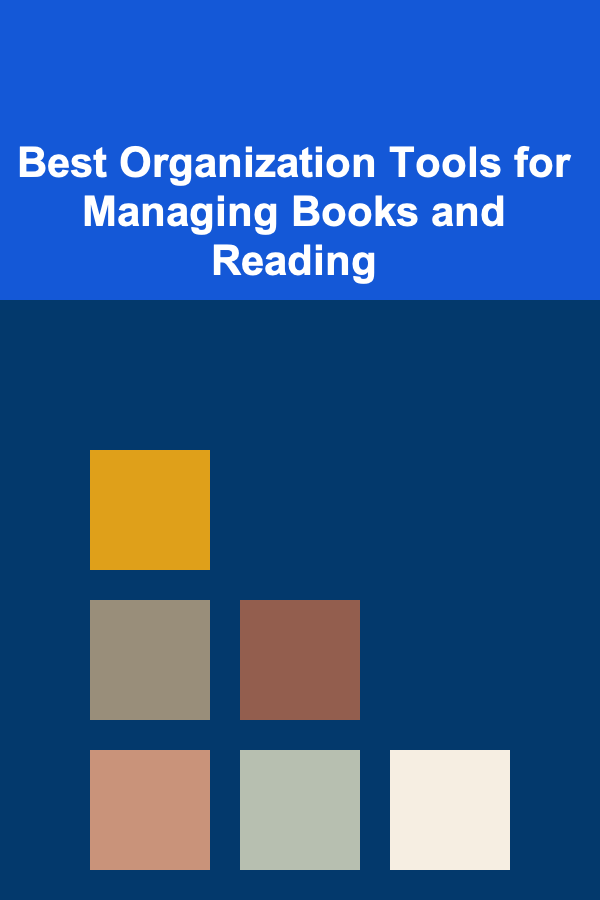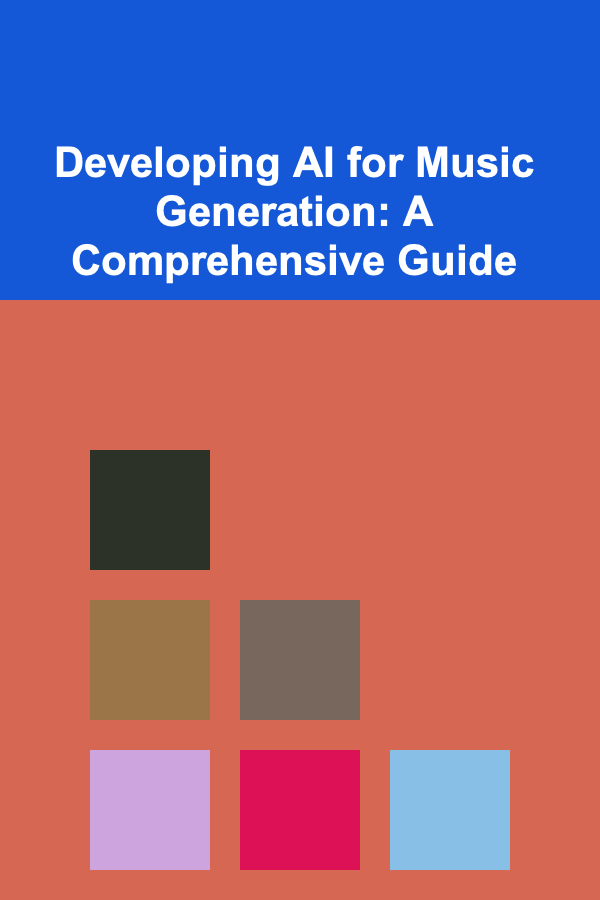
Best Organization Tools for Managing Books and Reading
ebook include PDF & Audio bundle (Micro Guide)
$12.99$5.99
Limited Time Offer! Order within the next:

In the modern world, where information flows rapidly and people are constantly bombarded with new content, organizing books and reading material can be both a rewarding and overwhelming task. For book lovers, avid readers, or even casual book collectors, maintaining an organized system for tracking, storing, and managing books is essential. With an array of genres, authors, and titles to navigate, the need for organization becomes more pressing. Fortunately, we live in an age where digital tools, apps, and physical systems can help streamline this process.
This article delves into the best organization tools for managing books and reading material, offering a comprehensive overview of both physical and digital solutions that can transform how we approach reading.
The Importance of Organizing Books and Reading Materials
Before exploring the various tools available, it's worth reflecting on why organizing books and reading is important. Here are some key reasons that underscore the need for a systematic approach:
1. Maximizing Space
A well-organized bookshelf or library helps maximize physical space, which is particularly useful for people who have limited room. Having an organized system allows you to store more books in a way that is easily accessible and doesn't create unnecessary clutter.
2. Efficient Search and Access
Searching for a book amidst an unorganized stack can be frustrating. By having a clear organization system, you can find books quickly and efficiently without wasting time. Whether it's an old favorite or a new release, organization can make locating books an effortless task.
3. Tracking Reading Progress
Whether you are trying to read a certain number of books within a year or just want to remember the last page you left off, an effective organization system helps you track your reading journey. This can involve noting down which books you've read, which ones you're currently reading, and which ones you intend to read next.
4. Sharing and Borrowing
If you lend books to others or borrow books from friends, having an organized system ensures that you can track who has which book at any given time. This reduces the risk of losing books and keeps your collection intact.
5. Preserving and Maintaining the Books
Organization isn't just about finding books; it's also about caring for them. By keeping your books properly stored, you can protect them from damage caused by poor handling or unfavorable conditions. An organized system helps you maintain your collection in excellent condition.
Digital Organization Tools for Managing Books
In today's digital age, there are numerous apps, platforms, and tools that allow readers to manage their books electronically. These tools help track reading progress, store digital copies, and even connect with other readers in a social setting. Let's explore some of the best digital tools for managing books.
1. Goodreads: The Ultimate Social Reading Platform
Goodreads is arguably the most well-known platform for managing books. It offers a variety of features for tracking your reading, discovering new books, and interacting with fellow book lovers.
Key Features:
- Reading Lists: You can create custom lists to categorize books. Popular lists include "Currently Reading," "Want to Read," and "Read," but users can create more specific lists, such as by genre, author, or personal rating.
- Book Reviews: Goodreads allows you to review books you've read, rate them on a scale from 1 to 5 stars, and offer your thoughts. This feature not only helps you reflect on your reading but also assists others in deciding whether to read a book.
- Reading Progress: Track your progress within books, including the ability to mark a specific page. This feature helps you stay on top of your reading habits.
- Reading Challenges: Goodreads hosts annual reading challenges where you can set a goal for how many books you wish to read in a year. This gamified aspect adds motivation to read more.
- Recommendations and Reviews: Based on your reading history and ratings, Goodreads suggests books tailored to your tastes. You can also explore user-generated reviews, which are often quite insightful.
Why it works for managing books: Goodreads combines social interaction with organizational tools. It allows you to connect with friends, share recommendations, and receive suggestions based on your past readings. The platform offers an all-in-one space for keeping track of your books.
2. LibraryThing: Catalog Your Books
LibraryThing is another powerful tool for cataloging and managing books. While it is less social than Goodreads, it offers extensive cataloging features that can be particularly appealing for serious collectors.
Key Features:
- Book Cataloging: Users can catalog their books by scanning barcodes, searching through the book database, or entering details manually. The system automatically populates book information, such as author, title, and publisher.
- Tagging and Categorization: LibraryThing allows users to add tags to their books, making it easy to group and search by themes, genres, or even personal annotations.
- Member Connections: Similar to Goodreads, LibraryThing has a community aspect where users can connect with others, share their collections, and participate in book discussions.
- Advanced Search and Sorting: LibraryThing provides powerful search and filtering options to help you manage large collections effectively. You can sort by author, title, date added, and other variables.
Why it works for managing books: LibraryThing is ideal for readers who have a substantial book collection and want to maintain a detailed, searchable catalog. It offers robust features for organizing and discovering books but with a primary focus on cataloging rather than social interaction.
3. Bookly: Your Personal Reading Assistant
Bookly is an app designed to help readers track their progress, manage reading goals, and set reminders to read regularly. It's great for those who are looking for a more hands-on approach to organizing their reading.
Key Features:
- Track Reading Time: Bookly allows you to track how much time you spend reading each day. The app provides detailed statistics that show your reading habits over time.
- Reading Goals: You can set specific reading goals, such as finishing a book by a certain date or reading a certain number of pages per day. This helps to keep your reading consistent.
- Book Library: Bookly has a library feature where you can store the books you are currently reading or intend to read, along with information about each book.
- Progress Monitoring: The app gives you a visual representation of your progress, so you can easily see how far you've come in each book.
Why it works for managing books: Bookly focuses on helping you create a reading routine and stay on track with your goals. It's an excellent tool for those who like to monitor and improve their reading habits.
4. Google Books and Google Play Books: Sync and Store Your Digital Library
Google Books and Google Play Books offer a cloud-based service for purchasing, storing, and managing books. While these tools are primarily designed for digital reading, they also provide organizational features for managing your library.
Key Features:
- Cloud Library: Google Play Books allows you to purchase and store books in the cloud, making them accessible across devices. You can organize your collection within the app by marking books as "Read" or "Want to Read."
- Synchronization: If you're reading on multiple devices, Google Books synchronizes your progress, so you never lose your place.
- Annotations and Highlights: The app allows you to annotate and highlight passages in the book, making it easy to review and recall important information.
- Search Function: With Google's powerful search capabilities, you can easily search for specific terms, authors, or topics within your digital library.
Why it works for managing books: Google Play Books offers a seamless way to manage and access your digital library across multiple devices. It's perfect for readers who prefer e-books and want to keep their collection synchronized and easily accessible.
5. Pocket: Save and Organize Reading Material from the Web
Pocket is a popular app that allows users to save articles, blog posts, and other web-based reading materials to read later. While it's not primarily designed for book management, it can be incredibly useful for organizing and saving online reading content.
Key Features:
- Save Content: Pocket lets you save articles and websites directly to the app, making it easy to curate a reading list of content you discover online.
- Tags for Organization: You can tag saved content with labels to organize it by theme, topic, or interest.
- Offline Reading: Once content is saved to Pocket, it can be read offline, which is great for on-the-go reading.
- Recommended Reading: Based on the content you save, Pocket recommends articles and blog posts that are similar to your interests.
Why it works for managing reading material: Pocket is an excellent tool for curating and managing online reading materials. It allows you to create a personal library of web articles that you can read later, without having to keep track of individual websites.
Physical Organization Tools for Managing Books
While digital tools are highly effective, physical tools still play a crucial role in organizing a personal library. From bookshelves to labeling systems, physical tools help keep books in order and ensure easy access.
1. Bookshelves: The Foundation of Book Organization
A well-organized bookshelf is the cornerstone of a physical library. It provides a space to store books in a manner that keeps them safe and accessible.
Key Features to Consider:
- Adjustable Shelves: Shelves with adjustable height allow for flexibility in organizing books of different sizes.
- Vertical and Horizontal Layouts: Whether you prefer stacking books horizontally or arranging them vertically, having a dedicated space for each will reduce clutter.
- Dedicated Sections: Categorizing books by genre, author, or subject matter makes it easy to locate and organize titles.
2. Book Labels and Dividers
For readers with large collections, book labels and dividers are essential for keeping things organized. These tools allow you to categorize books by various criteria, such as author name, genre, or personal ratings.
Why it works for managing books: Labels and dividers help provide visual cues that make it easier to locate books on shelves. For avid collectors, they help maintain an organized system even as the collection grows.
3. Book Cataloging Cards and Journals
For readers who prefer a more hands-on approach, book cataloging cards or journals can help keep track of books in a physical format. These tools allow you to note down important details about each book, such as author, publication date, and your personal thoughts on the book.
Why it works for managing books: Cataloging cards and journals are an excellent way to keep a record of books in your collection. They serve as a personalized cataloging method that you can update and refer to whenever needed.
Conclusion
Managing books and reading materials is no longer a cumbersome task, thanks to the variety of organization tools available. Whether you prefer digital tools like Goodreads, LibraryThing, and Google Books or physical methods such as bookshelves, labels, and cataloging cards, the right system can make your reading experience more enjoyable and efficient. The key is finding the tools that work best for you and your reading habits, and integrating them into your routine. By staying organized, you can maximize your reading potential, discover new books, and create a personal library that is both accessible and meaningful.
Reading More From Our Other Websites
- [Organization Tip 101] How to Select the Best Lighting for a Functional Living Room
- [Home Soundproofing 101] How to Improve Acoustic Privacy with Home Soundproofing
- [Home Space Saving 101] How to Optimize Your Space with Stackable Storage Bins
- [Organization Tip 101] How to Organize Beads and Small Craft Items
- [Biking 101] The Ultimate Guide to Kids Bikes: Features, Sizes, and Maintenance
- [Personal Care Tips 101] How to Choose a Lip Gloss with Hydrating Ingredients
- [Organization Tip 101] How to Set Goals for Your Paperwork Organization Journey
- [Home Staging 101] How to Stage a Home to Sell During the Winter Season
- [Home Rental Property 101] How to Design and Equip Houses for Rent with a Rec Room to Increase Rental Appeal and Value
- [Organization Tip 101] How to Use Minimalist Principles in Event Planning

10 Thrifty Gardening Tips for a Beautiful Garden on a Budget
Read More
Effective Strategies for Logistics Coordinators: Streamlining Operations and Delivery
Read More
How to Ensure Your Pet Gets Enough Exercise Indoors
Read More
How to Use Lighting to Define Different Areas in an Open Floor Plan
Read More
Developing AI for Music Generation: A Comprehensive Guide
Read More
How to Transport Your Jet Ski Legally and Safely
Read MoreOther Products

10 Thrifty Gardening Tips for a Beautiful Garden on a Budget
Read More
Effective Strategies for Logistics Coordinators: Streamlining Operations and Delivery
Read More
How to Ensure Your Pet Gets Enough Exercise Indoors
Read More
How to Use Lighting to Define Different Areas in an Open Floor Plan
Read More
Developing AI for Music Generation: A Comprehensive Guide
Read More